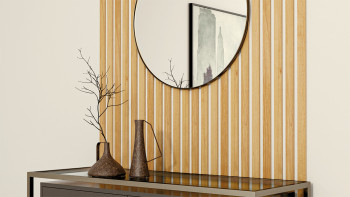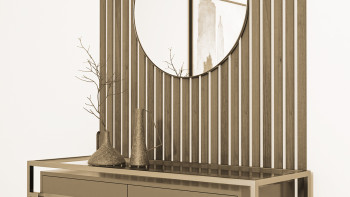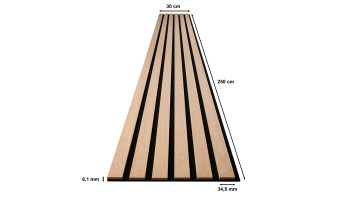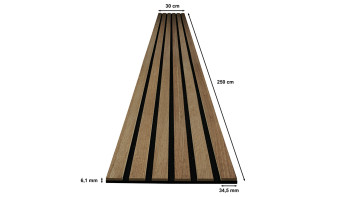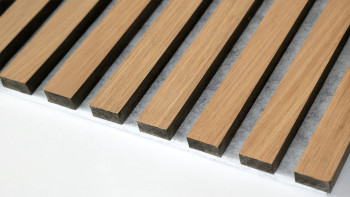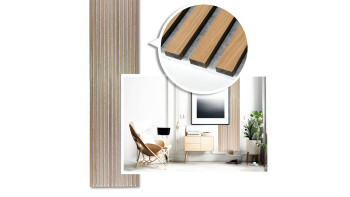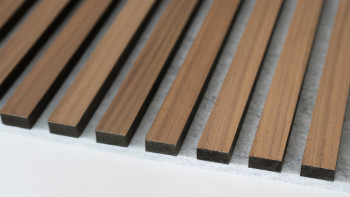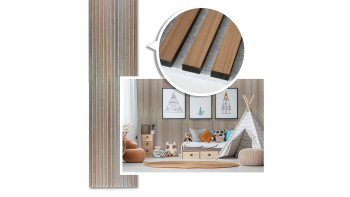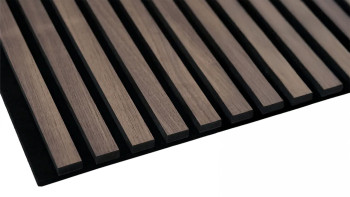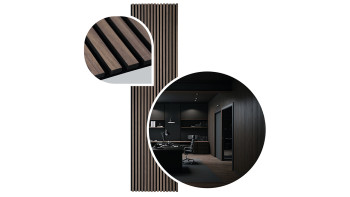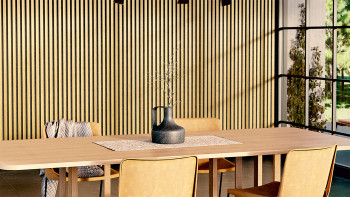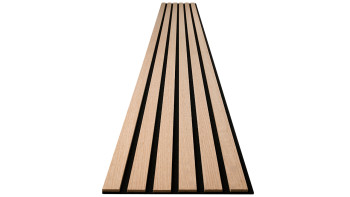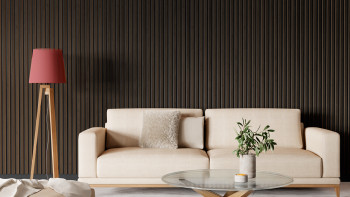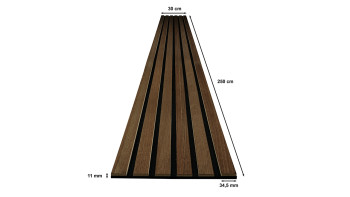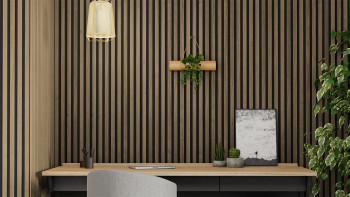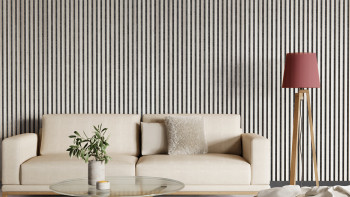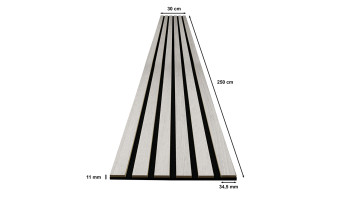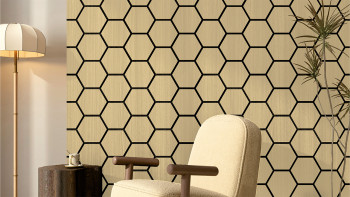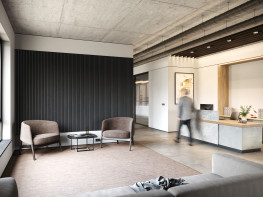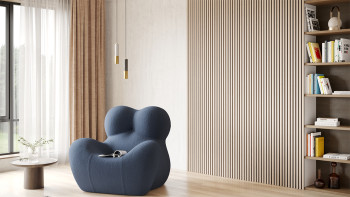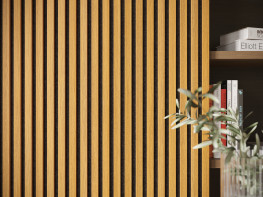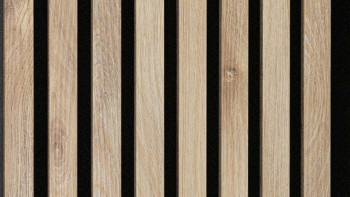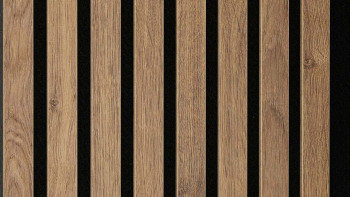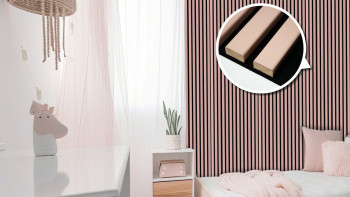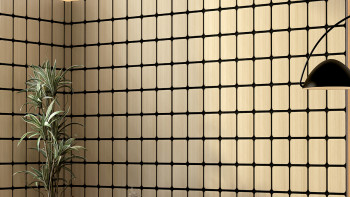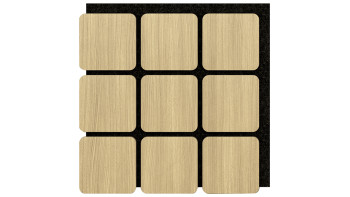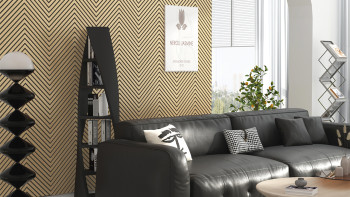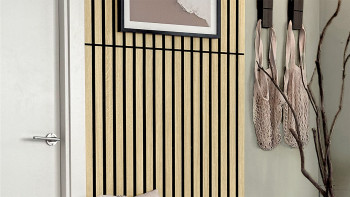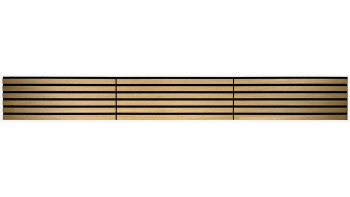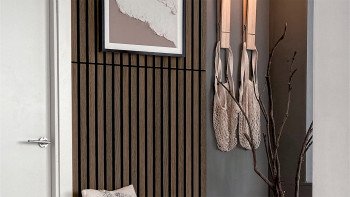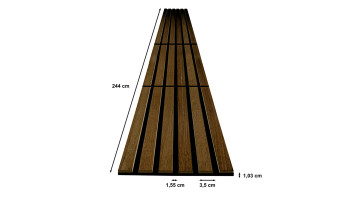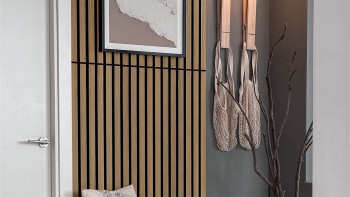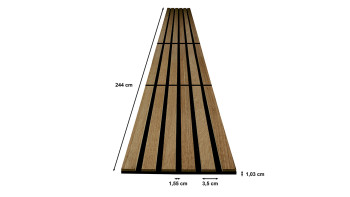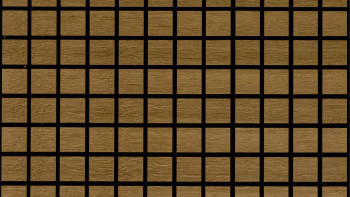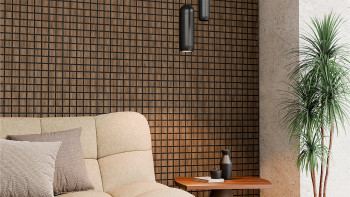What are Acoustic Panels and How do they Work?
Acoustic panels are specially designed elements that serve to improve room acoustics. They consist of sound-absorbing materials such as foam, mineral wool or wood fibre. These materials have a porous structure that absorbs sound waves like a sponge. The sound energy is converted into heat energy instead of being reflected. This reduces reverberation in the room and significantly improves sound quality.
Imagine clapping your hands. In an empty room with hard walls, you will hear a distinct echo as the sound is reflected off the surfaces. However, if acoustic panels are on the walls or ceiling, the echo is significantly attenuated because the panels absorb the sound.
Acoustic panels are not to be confused with sound insulation. While sound insulation aims to prevent the transmission of sound from one room to another, acoustic panels optimise the sound within a room. They ensure better speech intelligibility, reduce disturbing noise and create an overall more pleasant atmosphere.
The advantages of acoustic panels are manifold:
- Improved speech intelligibility: In rooms with many hard surfaces, there can be a strong echo, which makes speech intelligibility difficult. Acoustic panels absorb the sound and ensure that speech is perceived more clearly and distinctly.
- Noise reduction: Acoustic panels help to minimise disturbing noises, creating a quieter environment.
- Pleasant atmosphere: Reducing reverberation creates a more harmonious and relaxed room atmosphere.
Wood Acoustic Panels: Natural Look and Effective Sound Absorption
Wood is a fascinating material that has always been valued for its warm appearance and diverse applications. Wood also plays an important role in room acoustics. Wood acoustic panels uniquely combine functionality and aesthetics. They not only create a pleasant sound atmosphere but also give your rooms a natural charm.
The choice of wood types for acoustic panels is vast. Each type of wood has its own characteristic properties, which are reflected in its appearance and sound behaviour.
Oak: With its distinctive grain and warm colouring, oak radiates a timeless elegance. Oak acoustic panels blend harmoniously into various interior styles and give your rooms a touch of class. Thanks to its high density, oak also offers excellent sound-absorbing properties.
Beech: Beech is a robust and durable hardwood characterised by its light colour and even structure. Beech acoustic panels are particularly hard-wearing and are therefore ideal for rooms with high usage, such as children's rooms or public areas.
Spruce: Spruce is a native softwood with a light, friendly appearance. Spruce acoustic panels are a cost-effective alternative to hardwood panels and still impress with their good sound insulation. They contribute to a natural and comfortable room climate.
Maple: Maple wood captivates with its light colour and fine grain. It gives rooms a friendly and modern atmosphere. Maple acoustic panels are particularly popular in minimalist interiors.
Pine: Pine is a soft softwood with a warm, reddish colour. It spreads a natural scent and creates a cosy ambience. Pine acoustic panels are an inexpensive yet attractive option.
Each wood has its own individual character and opens up new design possibilities for you. But why is wood so popular as a material for acoustic panels? The advantages are obvious:
- Natural beauty: Wood brings nature into your home. The unique grain and warm colours create a homely and harmonious ambience.
- Versatile design: Wood can be treated in different colours and surfaces. Whether lacquered, oiled or stained - wood acoustic panels can be adapted to your individual wishes.
- Sustainability: Wood is a renewable resource and contributes to an environmentally conscious lifestyle. When choosing your acoustic panels, look for FSC-certified wood from sustainable forestry.
- Durability: Wood is a robust and durable material. With the right care, your wood acoustic panels will give you many years of pleasure.
Wood acoustic panels are an investment in your well-being and the design of your rooms. They create optimal room acoustics and give your home a natural elegance.
Acoustic Panels: The Right Choice for Every Room
Acoustic panels are not only functional elements for improving room acoustics but also stylish design elements that can be integrated into any room concept. Whether living room, bedroom, office or home cinema - acoustic panels create a pleasant atmosphere and increase well-being.
Acoustic Panels in the Living Room: How to Create a Cosy Atmosphere for Relaxed Evenings
In the living room, the central place for relaxation and togetherness, we spend time with family and friends, watch films or read a good book. Pleasant acoustics contribute significantly to the feel-good factor.
Acoustic panels absorb disturbing sound reflections and reduce reverberation. This creates a calmer and more harmonious atmosphere in which conversations can be held undisturbed and the television sound is perceived more clearly and distinctly.
In terms of design, acoustic panels offer a wide range of possibilities in the living room. Whether as an eye-catcher on the wall behind the sofa, as a subtle addition to the wall design or as a room divider - acoustic panels can be harmoniously integrated into any interior design concept.
Tip: Would you like to design your TV wall with acoustic panels? In our guide article "DIY TV Wall – Guide with Acoustic Panels" you will find step-by-step instructions and helpful tips.
Choose from different materials, colours and shapes and set accents that underline your individual style. Wood acoustic panels create a natural and warm atmosphere, while fabric or felt panels add a modern and elegant touch.
In the Bedroom: Acoustic Panels for a Peaceful Sleep
Peace and quiet are essential in the bedroom. Disturbing noises can impair sleep and lead to restlessness and stress. Acoustic panels create an oasis of calm and ensure a restful sleep.
By absorbing sound waves, acoustic panels reduce reverberation in the room and minimise disturbing noises from outside or other rooms. This allows you to sleep undisturbed and start the new day refreshed.
Acoustic panels can also be tastefully integrated into the room design in the bedroom. Subtle colours and soft materials contribute to a calming atmosphere. For example, place the acoustic panels on the wall behind the bed or on the ceiling to achieve optimum sound insulation.
Increase Concentration with Acoustic Panels in the Office
Concentration is required in the office. Noise and poor room acoustics can disturb concentration and impair productivity. Acoustic panels in the office create a quiet and focused working atmosphere.
By reducing sound reflections and reverberation, acoustic panels ensure better speech intelligibility and minimise disturbing noise. This allows you to concentrate better on your work and work more efficiently.
Acoustic panels in the office can be flexibly adapted to the workplace. Whether as wall panels, ceiling sails or desk attachments - there is a suitable solution for every room situation. Design your office with acoustic panels that meet your needs and style.
Acoustic Panels in the Home Cinema: For an Optimal Sound Experience
A home cinema promises a cinematic feeling in your own four walls. Acoustic panels are indispensable in the home cinema to optimise the sound experience and minimise disturbing sound reflections.
Acoustic panels absorb the sound and prevent it from being reflected off the walls. This creates a clear and precise sound that intensifies the film experience. Dialogues are easier to understand, sound effects are more powerful and the music creates emotional depth.
When placing the acoustic panels in the home cinema, you should consider the position of the loudspeakers and the seating. Targeted arrangement of the panels on the walls and ceiling ensures optimum sound distribution and an impressive sound experience.
Installing Acoustic Panels: It's That Easy
You have decided on the right acoustic panels and now want to install them? Don't worry, the installation is usually uncomplicated and can be easily done by DIY enthusiasts with a little manual skill.
Here are step-by-step instructions:
- Planning: Before you start the installation, plan the arrangement of the acoustic panels. Consider where you want to place the panels and how many you need.
- Preparation: Clean the wall surface thoroughly so that the adhesive or screws adhere optimally. Make sure the surface is dry and free of dust.
- Marking: Mark the position of the acoustic panels on the wall. Use a spirit level to ensure that the panels are aligned straight.
- Fastening: There are different ways to fasten acoustic panels:
- Glue: Use a special mounting adhesive for acoustic panels. Apply the adhesive to the back of the panels in dots or wavy lines and press them firmly against the wall.
- Screws: Drill holes in the wall and fasten the acoustic panels with screws. Use suitable dowels for this.
- Magnets: Some acoustic panels can be attached to the wall with magnets. This method is particularly suitable for rented apartments, as the wall is not damaged.
Tips for choosing the right adhesive:
- Make sure that the adhesive is suitable for acoustic panels and has a high adhesive strength.
- Choose an adhesive that dries quickly and leaves no residue.
- For heavy acoustic panels, an extra-strong assembly adhesive is recommended.
You can find further helpful information on installing acoustic panels in our guide articles:
Are Acoustic Panels Soundproof?
This question is often asked, and the answer is: it depends! Acoustic panels are often associated with sound insulation, but there is an important difference.
Sound insulation refers to the ability to block the transmission of sound from one room to another. Imagine a thick wall that prevents noise from the street from entering your living room.
Sound absorption, on the other hand, describes the ability of a material to absorb sound energy and convert it into heat. Acoustic panels are primarily sound absorbers. They reduce reverberation within a room by "trapping" sound waves and preventing them from being reflected off the walls.
While acoustic panels can help reduce sound transmission between rooms, they are not as effective as dedicated soundproofing materials. If your main goal is to block noise from outside or prevent noise from travelling from one room to another, you should consider additional soundproofing measures.
Buying Acoustic Panels: What to Look Out For
The choice of acoustic panels is vast. To find the right panels for your needs, you should consider some important criteria.
Material: Acoustic panels are made from different materials that differ in appearance, feel and acoustic properties.
- Wood: Wood acoustic panels create a natural and warm atmosphere. They are available in various types of wood and finishes.
- Fabric: Fabric acoustic panels offer a wide range of colours and designs. They are often lighter than wood panels and can be flexibly attached.
- Felt: Felt acoustic panels look modern and elegant. They are available in various colours and thicknesses and offer good sound-absorbing properties.
Size and format: Acoustic panels are available in different sizes and formats. Choose the size and shape of the panels according to the size of the room and your individual design wishes.
Design: Acoustic panels are not only functional elements but also design elements. Choose a design that matches your interior design style and visually enhances your rooms.
Fire protection: When buying acoustic panels, pay attention to the fire protection class. Special fire protection regulations apply in public buildings and commercial premises.
Acoustic Panel Prices: What do Acoustic Panels Cost?
Prices for acoustic panels vary depending on the material, size, design and manufacturer. Inexpensive acoustic panels made of wood or felt are already available from around 30 euros per square metre. However, for good quality acoustic panels, you should expect prices from around 50 euros per square metre. Exclusive design panels made of high-quality materials can be significantly more expensive.
Factors that influence the price:
- Material: Wood panels are usually more expensive than fabric or felt panels.
- Size: Large panels are often cheaper per square metre than small panels.
- Design: Elaborate designs and individual customisations can increase the price.
- Manufacturer: Brand manufacturers often offer high-quality acoustic panels at higher prices.
Acoustic Panel Samples: Order Free Samples
Would you like to convince yourself of the quality and appearance of our acoustic panels? Order free samples and compare the different materials and designs from the comfort of your home. This allows you to make the perfect choice for your rooms.
Conclusion: More Peace and Well-being with Acoustic Panels
Acoustic panels are an effective and stylish solution to improve the room acoustics in your rooms. They reduce reverberation, absorb disturbing noises and create a more pleasant atmosphere. Whether living room, bedroom, office or home cinema - acoustic panels increase well-being and can be harmoniously integrated into any room concept.
Discover our wide selection of acoustic panels made of wood, fabric and felt in various designs and colours. Order free samples and find the right panels for your home!
